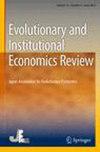柯布-道格拉斯生产函数为何如此流行?
IF 0.6
Q4 ECONOMICS
Evolutionary and Institutional Economics Review
Pub Date : 2024-04-05
DOI:10.1007/s40844-024-00279-x
引用次数: 0
摘要
众所周知,在连续时间内,根据一些合理的假设(要素份额不变,劳动力投入价格和资本投入价格的加权增长不变),可以从基本的、受数据支配的会计特性推导出柯布-道格拉斯函数。本文从三个方面对这些结果进行了概括:(1) 会计特性包含一个(纯)利润项;(2) 连续时间被离散时间段所取代;(3) 额外的假设似乎是多余的。文章还讨论了扩展:从两种投入到多种投入,从附加值到总产出,以及从单一生产单位到这些单位的集合。本文章由计算机程序翻译,如有差异,请以英文原文为准。
Why is the Cobb-Douglas production function so popular?
It is well known that, in continuous time, the Cobb-Douglas function can be derived from the underlying, data governing, accounting identity under some reasonable assumptions (factor shares are constant, and the weighted growth of the labour input price and the capital input price is constant). In this article these results are generalized in three ways: (1) the accounting identity contains a (pure) profit term; (2) continuous time is replaced by discrete time periods; (3) additional assumptions appear to be superfluous. The article also discusses extensions: from two to multiple inputs, from value added to gross output, and from a single production unit to an ensemble of those units.
求助全文
通过发布文献求助,成功后即可免费获取论文全文。
去求助
来源期刊
自引率
0.00%
发文量
15
期刊介绍:
The Evolutionary and Institutional Economics Review (EIER) is issued by the Japan Association for Evolutionary Economics to provide an international forum for new theoretical and empirical approaches to evolutionary and institutional economics. EIER, free from the view of equilibrium economics and methodological individualism, should face the diversity of human behavior and dynamic transformation of institutions. In EIER, “economics” is used in its broadest sense. It covers areas from the classic research in economic history, economic thought, economic theory, and management science to emerging research fields such as economic sociology, bio-economics, evolutionary game theory, agent-based modeling, complex systems study, econo-physics, experimental economics, and so on. EIER follows the belief that a truly interdisciplinary discussion is needed to propel the investigation in the dynamic process of socio-economic change where institutions as emergent outcomes of human actions do matter. Although EIER is an official journal of the Japan Association for Evolutionary Economics, it welcomes non-members'' contributions from all parts of the world. All the contributions are refereed under strict scientific criteria, although EIER does not apply monolithic formalistic measure to them. Evolution goes hand in hand with diversities; this is also the spirit of EIER. Focus areas of the Review (not exhaustive): - Foundations of institutional and evolutionary economics - Criticism of mainstream views in the social sciences - Knowledge and learning in socio-economic life - Development and innovation of technologies - Transformation of industrial organizations and economic systems - Experimental studies in economics - Agent-based modeling of socio-economic systems - Evolution of the governance structure of firms and other organizations - Comparison of dynamically changing institutions of the world - Policy proposals in the transformational process of economic life

 求助内容:
求助内容: 应助结果提醒方式:
应助结果提醒方式:


